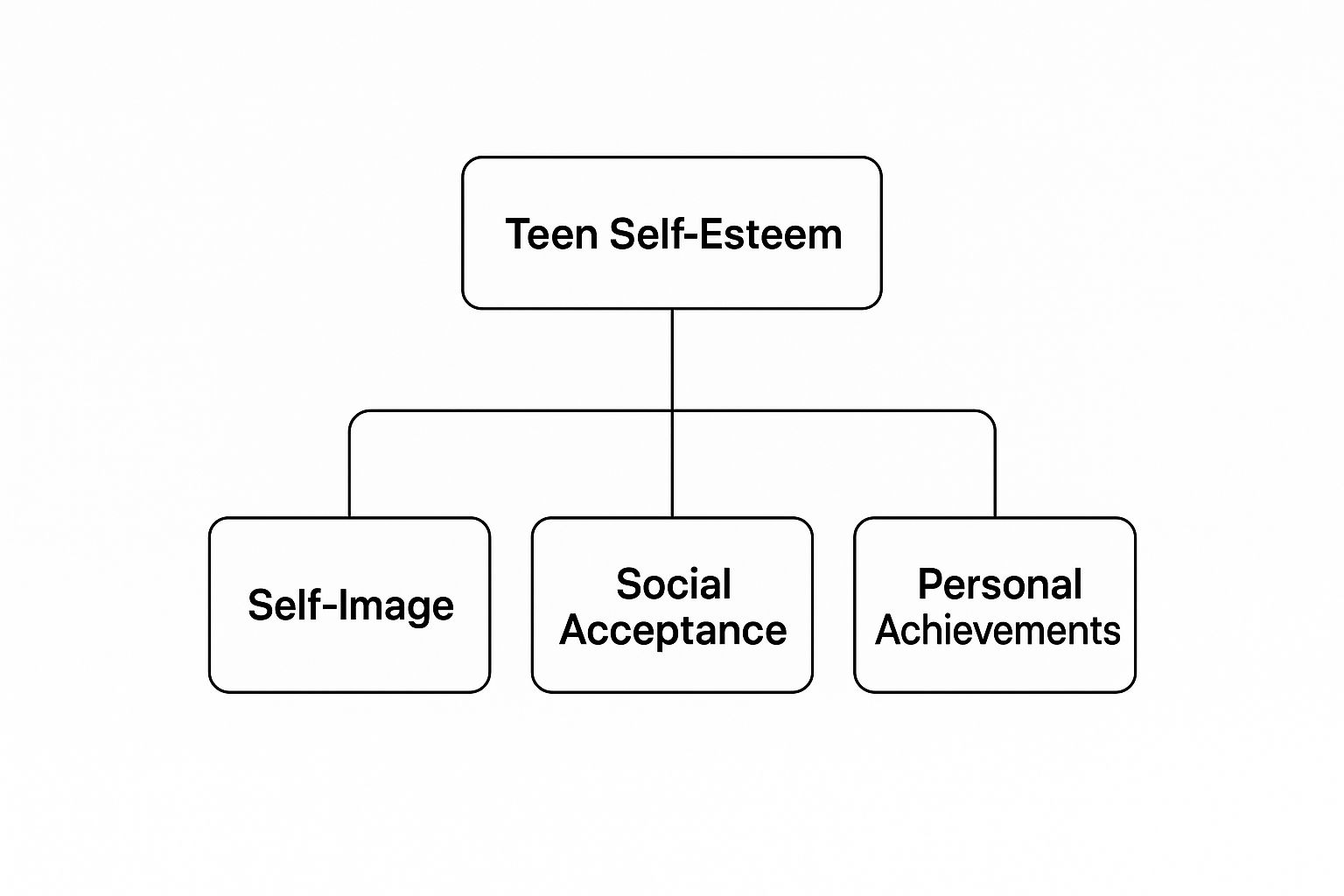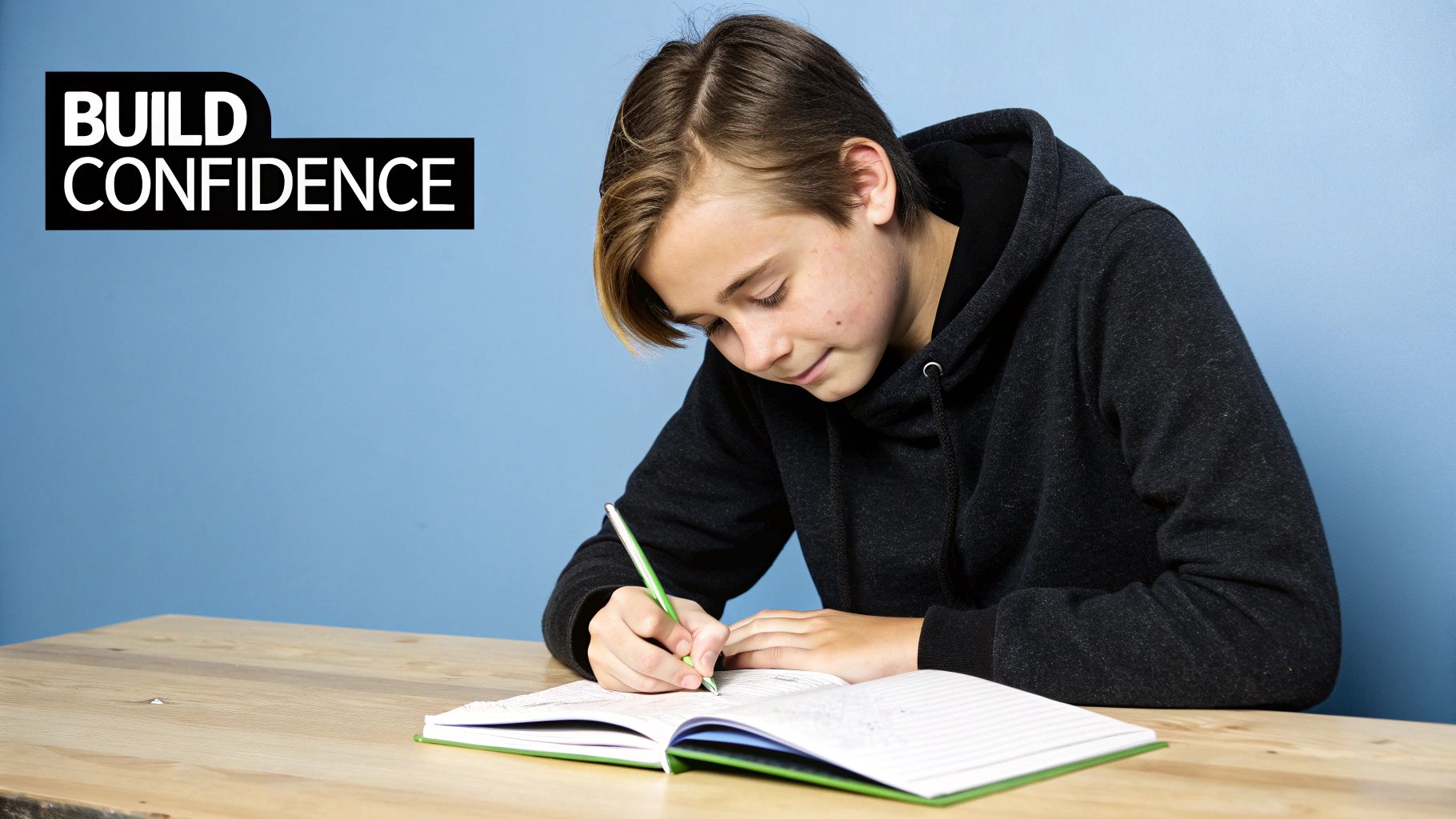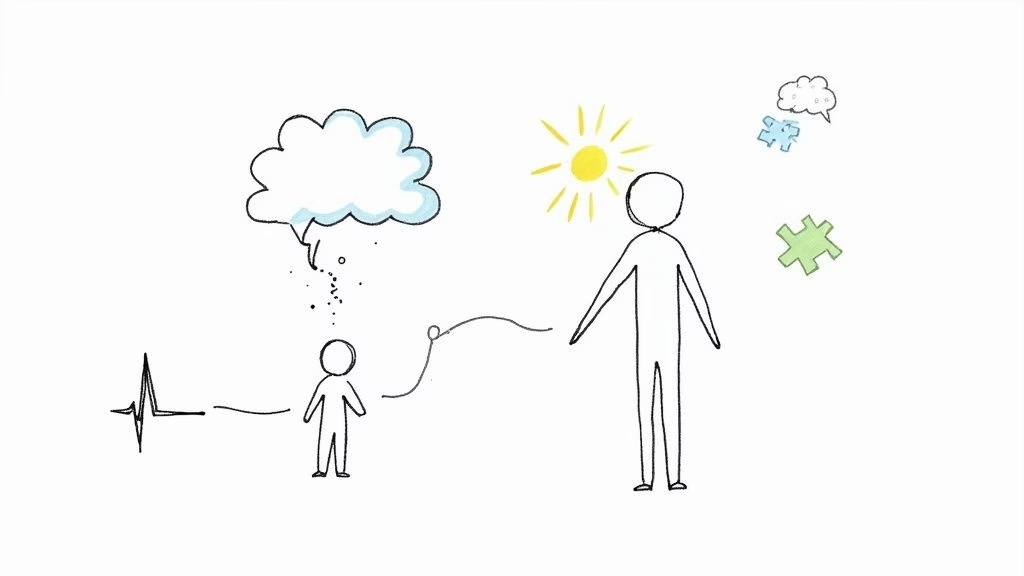Fostering self-esteem in a teenager is one of the most important things we can do as parents and mentors. It's the very foundation of how they see themselves and their place in the world, acting as an internal compass that guides their choices, resilience, and overall happiness. A strong sense of self-worth is what separates a rocky transition into adulthood from a healthy, confident one.
Why Teenage Self-Esteem Is More Fragile Than Ever
Think of a teen’s self-esteem like a ship's rudder during a storm. With a strong, reliable rudder, a ship can hold its course through turbulent waters, correcting its path against powerful waves and winds. In the same way, a teen with healthy self-esteem can navigate the inevitable storms of adolescence—peer pressure, academic stress, and personal setbacks—with far more grit and confidence.
But without a working rudder, that ship is just tossed about by the currents, completely at the mercy of the storm. For a teen, low self-esteem creates a similar vulnerability. It leaves them more susceptible to negative influences, less likely to bounce back from failure, and more prone to struggles with their mental health. Their self-perception directly shapes their motivation, relationships, and ability to cope with life's pressures.
The Connection Between Self-Worth and Mental Health
We can’t afford to ignore how critical this is, especially since low self-worth is so deeply tied to serious mental health challenges. Research from organizations like the U.S. Department of Health and Human Services highlights a growing mental health crisis among youth, directly linked to issues of self-esteem. The data is sobering: nearly 40% of high school students report persistent feelings of sadness or hopelessness. This distress often links back to low self-esteem, where feelings of worthlessness can fuel both anxiety and depression.
Even more alarming, emergency room visits for self-harm among U.S. teens have doubled in the last decade. You can explore more data on the mental health crisis and its connection to self-worth to get the full picture.
This infographic breaks down the core components that come together to shape a teenager's sense of self.

As you can see, a teen's self-esteem isn't just one thing. It's a complex mix of how they see themselves (self-image), how accepted they feel by others (belonging), and what they feel they can achieve (competence).
Below is a table that organizes these concepts into two main categories: the internal feelings a teen has about themselves and the external validation they receive from their environment.
Core Pillars of Teen Self-Esteem
| Pillar Category | Key Influences | Effect on Self-Esteem |
|---|---|---|
| Internal Pillars | Self-image, personal values, emotional awareness, self-compassion. | These factors build a teen's inner foundation. A positive internal view allows them to feel worthy regardless of outside opinions or setbacks. |
| External Pillars | Peer acceptance, family support, academic/extracurricular achievements, social feedback. | These influences shape how a teen feels validated by the world. Positive external feedback reinforces a sense of belonging and competence. |
Both of these pillars are essential. A teen needs a strong internal sense of self to weather external criticism, but they also need positive reinforcement from the outside world to feel connected and capable.
From Procrastination to Motivation
This fragile sense of self has a direct impact on a teen's academic life, influencing motivation and school performance. Procrastination and a lack of motivation are often mistaken for laziness, but they’re usually symptoms of a much deeper fear of failure. When a teenager’s self-worth is tied exclusively to their performance, the pressure to be perfect can become paralyzing.
A teen who secretly fears they aren't "good enough" may avoid trying altogether. It's a way to protect themselves from the potential pain of not meeting expectations. This avoidance is a defense mechanism rooted squarely in low self-esteem.
Understanding this connection is the first real step you can take as a parent. By shifting your focus to building their core confidence, you can help them break this cycle. The key is to address the root cause, helping your teen move from fear-based procrastination to genuine, internal motivation. When you nurture their self-worth, you empower them to face challenges—at school and beyond—with a stronger, more resilient mindset.
Recognizing the Hidden Signs of Low Self Worth

Low self-esteem in a teenager rarely shows up wearing a sign that says, “I’m struggling.” It’s much more subtle than that. It often hides behind behaviors we might dismiss as typical teen moodiness, attitude, or even just plain laziness.
As a parent, learning to see past the surface is like becoming a detective in your teen’s emotional world. The clues are there, but they’re often disguised. Spotting them early gives you a chance to step in and offer support before those quiet insecurities start to feel like permanent problems.
The Camouflage of Self-Criticism
One of the most common masks for low self-worth is harsh self-criticism that’s passed off as a joke. You might hear your teen constantly put themselves down, calling themselves “stupid” after a simple mistake or “so awkward” after a social event.
It might seem like they’re just being funny, but it’s often a defense mechanism. By getting the criticism in first, they control the narrative around what they see as their flaws. Over time, that constant negative self-talk—even when it sounds like a joke—chips away at their core sense of value.
Another huge red flag is a powerful resistance to trying new things. This isn't just about a teen who likes staying home. It's a deep-seated fear of failure. A teen struggling with their self-worth might refuse to try out for a team, join a club, or even tackle a challenging school project because the thought of not being good enough is completely overwhelming.
This fear can also show up as a sudden disinterest in activities they once loved. If your passionate artist suddenly drops their pencils or your aspiring guitarist lets their instrument gather dust, it might not be a simple change of heart. The pressure to perform or the fear of not measuring up may have just become too heavy to carry.
Low self-esteem is not a fixed state but a dynamic one, heavily influenced by external pressures and internal beliefs. Research shows that body image is a significant factor, especially for girls.
This is a widespread issue. In the UK, it’s estimated that somewhere between one-third and one-half of all adolescents are dealing with low self-esteem. The problem is especially sharp for girls, with 61% of those aged 10 to 17 reporting that their low self-worth is directly tied to how they feel about their bodies. This can lead to dangerous behaviors, as 35% of UK teens admit to having stopped eating because of worries about their appearance. You can discover more about these teen self-esteem statistics to understand the true depth of the challenge.
Motivation, School, and Procrastination
The link between low self esteem in a teenager and their life at school is undeniable. Chronic procrastination and what looks like a lack of motivation are rarely about laziness. More often than not, they are symptoms of a fear of inadequacy.
Put yourself in their shoes for a moment: if you truly believe you aren’t smart enough to succeed, why would you even start the assignment? Putting it off becomes a way to avoid the feeling of failure you’re already expecting. This creates a painful cycle:
- Fear of Failure: The teen is convinced their work won't be good enough.
- Procrastination: They delay starting the task to avoid the anxiety that comes with it.
- Rushed Work: They finally tackle the assignment at the last minute, leading to a subpar result.
- Confirmation: The poor outcome reinforces their belief that they aren't capable, and the cycle starts all over again.
Seeing this pattern for what it is—a cry for help, not a time management problem—is critical. It’s driven by a core belief that they simply aren’t good enough.
When you notice these signs, the goal is to connect, not to correct. Try opening up a dialogue by acknowledging the pressure they might be under. Instead of, "Why haven't you started your homework?" maybe try, "This project seems like a lot. How are you feeling about it?" That small shift in your approach can be the key that unlocks a real conversation about what’s actually going on.
The Modern Pressures Eroding Teen Confidence

Let's be honest: being a teenager has never been a walk in the park. But today's teens are up against a whole new set of pressures—intense, digital, and relentless in a way past generations never experienced. If you want to offer real support, you first have to understand the modern landscape that's actively chipping away at their confidence.
One of the biggest culprits? Social media. It's not just an app; it's a 24/7 social arena where teens are surrounded by the curated "highlight reels" of everyone they know. Every filtered photo and perfect post creates an impossible standard, turning reality into a performance. This isn't just a little envy; it's a non-stop engine of social comparison.
It's a psychological trap. Teens end up measuring their own messy, real-world lives against a polished, digital fantasy. This constant evaluation makes them feel like they're always falling behind, breeding a sense of inadequacy that can poison the roots of self esteem in a teenager.
The Double-Edged Sword of Academic Pressure
Beyond the screen, the pressure cooker of academics has been turned up to a whole new level. We live in a culture that often screams, "Achievement is everything!" Many teens internalize this, believing their worth is tied directly to their last test score, their GPA, or the college acceptance letters they receive.
This creates a dangerously fragile sense of self. When a teen’s entire identity is wrapped up in being a "high-achiever," the fear of failure becomes catastrophic. It feels easier to just not try at all—to procrastinate—than to risk facing what they see as proof of their own inadequacy. It’s not that their motivation is gone; it’s just buried under a mountain of anxiety.
This is exactly why telling a teen to "just try harder" can be so damaging. The problem isn't laziness; it's a deep-seated fear.
"A crucial piece of advice… is to offer connection not correction. When the temperature is lowered and moods have stabilized, then we talk about systems and reminders. It’s hard to offer empathy when you feel real rage, believe me. But we’re all better for it."
This simple shift changes everything. It moves the focus from trying to fix the behavior to understanding the emotion behind it. For many teens, especially boys, finding mentors who can guide them through this pressure is an absolute game-changer. You can learn more about this in our guide on teen boys' mental health and the need for real-world mentorship.
The Data Behind the Decline
This isn't just a feeling; the numbers back it up. We're seeing a measurable and frankly, alarming, drop in confidence among adolescents. Recent data shows that by 9th grade, only 50% of girls in the U.S. report feeling confident. That's a sharp drop from 60% in 2017. A huge driver of this is social media, which pours fuel on the fire of social comparison.
The situation has become so serious that the U.S. Surgeon General has labeled the decline in youth mental health the defining public health crisis of our time.
To build genuine self esteem in a teenager, we have to start with empathy for the world they're living in. Their struggle isn't just a personal failing; it's a shared challenge shaped by incredibly powerful forces. Acknowledging these pressures is the first real step toward helping them build a stronger, more authentic sense of self.
Actionable Parenting Tips to Build Real Confidence
Building real, lasting self-esteem in a teenager has almost nothing to do with empty praise or shielding them from every failure. Instead, it’s about creating an environment where they learn to find their worth from the inside out. This means focusing on real-world parenting tips that teach them resilience, self-compassion, and the power of their own effort.
Your role isn't to be a director, but more of a coach. The goal is to give them the tools to navigate life's inevitable challenges and build a sense of self that doesn't crumble under pressure.
Foster a Growth Mindset Environment
So many teens feel like their abilities are set in stone—they’re either "good at math" or "bad at it," with no in-between. This fixed mindset makes failure feel like a final verdict on their worth. The antidote is to introduce the idea of a growth mindset, which is simply the understanding that our brains and abilities can grow and change with dedication and hard work.
You can sprinkle this concept into everyday conversations. Talk about how the brain is constantly forming new connections (neuroplasticity) and point out specific areas where you've seen them improve over time. This small shift helps them see that effort, not just some innate talent, is what truly drives success.
A core principle of building self esteem in a teenager is to reframe mistakes. When your teen sees failures as learning opportunities instead of character flaws, they build the resilience needed to get back up and try again.
This reframing is a game-changer. When they stumble, try asking questions that encourage reflection instead of shame:
- "What did you learn from this?"
- "If you had a do-over, what might you try differently?"
- "What’s one small thing you can do to move forward from here?"
Shift Your Language from Praise to Acknowledgment
The words we choose as parents carry immense weight. It’s completely natural to want to praise our kids for their achievements, but focusing too much on the result ("You got an A, you're so smart!") can accidentally tie their entire self-worth to their performance. When they inevitably fall short, their confidence takes a nosedive.
A much better approach is to shift your language to praise their process and effort. This builds a more durable form of confidence that’s rooted in something they can actually control: their own perseverance.
| Instead of This (Praising Results) | Try This (Acknowledging Effort) |
|---|---|
| "You're a natural at soccer!" | "I was so impressed with your hustle on the field today." |
| "You're so talented at art." | "I can see how much thought you put into that drawing." |
| "You're so smart for acing that test." | "Your hard work and consistent studying really paid off." |
This simple change celebrates qualities they have power over—like hard work, strategy, and resilience—which empowers them to face future challenges without that paralyzing fear of failure.
Master Active Listening and Empathy
When a teen is struggling, our first instinct is often to jump in with advice and solutions. But more often than not, what they really need is just to feel seen and heard. Active listening—listening to understand, not just to reply—is one of the most powerful parenting tips for building trust and strengthening their sense of self-worth.
The next time your teen opens up about a problem, resist the urge to immediately fix it. Instead, just offer empathy. A simple, "Wow, that sounds incredibly frustrating," validates their feelings and opens the door for a real conversation. It shows them their emotions are okay, which is a cornerstone of self-acceptance.
Along the same lines, always try to connect before you correct. If your teen makes a mistake that frustrates you, take a beat to get your own emotions in check. Leading with empathy—"I know this is tough. It stinks you have to re-do this"—lowers their defenses and makes them far more receptive to problem-solving. If you are interested in exploring this topic further, there are many expert guides about how to build confidence that can offer additional strategies. This connection-first approach can have a profound impact on their motivation and willingness to grow.
Breaking The Cycle Of Procrastination And Low Motivation

We’ve all seen it: the unsubmitted homework, the project left until the last minute, the endless chorus of "I'll do it later." It’s incredibly frustrating, and it's easy to label it as laziness or a lack of discipline. But I’ve learned that, more often than not, chronic procrastination isn't about time management at all. It's a symptom of something much deeper—a fragile self-esteem.
Think of it this way: procrastination is often a defense mechanism. For a teenager whose sense of worth is tangled up in their school performance, the fear of not being "good enough" is paralyzing. It feels safer to avoid the task completely than to try, fail, and have their deepest insecurities confirmed.
This traps them in a vicious, self-defeating cycle. The fear of failure leads to putting things off, which forces a rushed, last-minute effort. The work they turn in is often subpar, which they then see as hard proof of their inadequacy. This reinforces the original fear, fueling the next round of procrastination.
From Correction To Connection
When you see this pattern, the first instinct is often to crack down—tighter rules, more nagging, stricter deadlines. But that rarely works. A far more effective approach starts with connection, not correction. To break the cycle, you have to understand the emotion driving the behavior.
A crucial shift happens when we move from frustration to empathy. When a teen messes up or falls behind, their immediate reaction is often shame. In that moment, one of the most powerful things a parent can do is resist the urge to lecture.
Instead of asking, "Why did you wait so long to start this?" try saying, "I know this project feels overwhelming. It stinks that you have to rush now. Let's figure out a plan together."
This simple change of tone validates their feelings and immediately lowers their defenses. It shows them you're an ally, not just an enforcer. Once the emotional temperature drops, they become much more open to actually talking about strategies and systems to manage their work.
Practical Strategies To Build Momentum
After you’ve laid a foundation of connection, you can start introducing practical tools to help your teen break free. The goal here isn't perfection; it's about creating small, manageable wins that build their confidence and prove to them that they are capable.
Here are a few strategies that work:
- Implement Task Chunking: A massive project can feel like an unclimbable mountain. Help your teen break it down into tiny, specific steps, like "find three sources" or "write the introduction." Checking off these small items creates a feeling of accomplishment and makes the whole thing feel less daunting.
- Focus On Process, Not Just Grades: Shift the conversation away from the final grade and onto the learning process itself. Celebrate their effort, their curiosity, and their grit when they pushed through a tough problem. This teaches them their value isn't tied to an outcome but to their willingness to try and grow.
- Encourage Self-Compassion: Help your teen understand that everyone makes mistakes and that a single setback doesn't define them. When they're being hard on themselves, encourage them to talk to themselves with the same kindness they'd offer a friend in the same situation.
By addressing the root cause—the low self-worth—you help your teen rediscover their own internal drive. This approach is about transforming fear into action and helping them build the academic confidence they need to succeed.
To dive deeper into this topic, explore our detailed guide on how to stop procrastinating.
Finding the Right Mental Health Support
There comes a point in parenting when you realize your love and support might need a boost from a professional. This isn't a sign you’ve failed—far from it. Recognizing your teen needs more is an act of incredible strength and love. Supporting your teen’s mental health is a team effort, and sometimes the best move you can make is bringing a trained therapist or counselor onto the team.
Taking that first step can feel overwhelming, but it’s a proactive choice that can genuinely change the course of your teen’s journey toward healthy self esteem in a teenager.
It’s all about finding the right fit. A therapist who gets teenagers will understand the unique pressures they're under, from social anxiety to academic stress. They have specific tools to help teens build self-worth in a way that actually clicks with them, not in a way that feels like another lecture from an adult.
How to Approach Seeking Professional Help
When you start this search, bringing your teen into the conversation from the get-go can make all the difference. Try to frame it as adding new tools to their emotional toolkit, not as a punishment or a sign that they're "broken."
- Involve Your Teen: Whenever you can, give them a say. Let them browse therapist profiles or websites with you. When they feel like they have some control in the choice, they’re much more likely to buy into the process.
- Normalize It: Talk about therapy like you would a doctor's check-up. It's just a normal part of staying healthy. This helps chip away at the stigma that can make teens feel ashamed or resistant to getting help.
- Manage Expectations: Be honest that finding the right therapist can take a few tries, and that’s perfectly okay. The goal is to find someone they feel safe and comfortable talking to.
A huge part of supporting your teen is knowing when your own love and guidance can be strengthened by professional expertise. Bringing in a mental health professional is one of the most powerful and supportive things a parent can do.
Where to Find Help: Key Resources
Knowing where to even start looking is often half the battle. Thankfully, there are many incredible organizations out there dedicated to providing support, information, and resources for both teens and their parents. These can be a lifeline, whether you're in a crisis or just looking for a community that gets it.
Here’s a quick-reference table to help you find reliable mental health support.
Mental Health Support Resources for Teens and Parents
| Resource Type | Organization or Service | Primary Focus |
|---|---|---|
| Crisis Support | The Trevor Project | Provides 24/7 crisis intervention and suicide prevention services to LGBTQ young people under 25. |
| Information & Advocacy | National Alliance on Mental Illness (NAMI) | Offers educational programs, support groups, and vital resources for individuals and families affected by mental illness. |
| Therapist Directory | Psychology Today | Features a searchable database of therapists, so you can filter by specialty (like adolescents), insurance, and location. |
| Teen & Parent Resources | The Jed Foundation (JED) | Focuses on protecting emotional health and preventing suicide for teens and young adults, offering great resources for schools and parents. |
These organizations are committed to making mental health less mysterious and connecting families with the help they deserve. Digging into their websites can empower you to make informed decisions for your family. Research from trusted sources like the Child Mind Institute consistently shows that getting the right help early is key to helping teens build the resilience they need to thrive.
By navigating this path, you're showing up as your child's strongest advocate—committed to helping them build a foundation of self-worth that will last a lifetime.
Common Questions About Teen Self-Esteem
Figuring out how to support your teen's self-esteem can feel like trying to solve a puzzle with moving pieces. It's totally normal to have questions as you guide them through this critical time. Here are some straightforward answers to the concerns I hear most often from parents.
How Can I Praise My Teen Without Making Them Dependent on Achievement?
This is a fantastic question, and it gets right to the heart of building genuine, lasting confidence. The key is to shift your praise from the outcome to the process. When you celebrate their effort, resilience, and problem-solving skills, you're anchoring their self-worth in qualities they actually control.
Instead of saying, "You're so smart for getting an A," which ties their value to a grade, try something like: "I am so impressed with how consistently you studied for that test. Your hard work really paid off." This simple switch helps them build a growth mindset. They learn their value comes from their dedication and ability to learn—not just from hitting a target. It's a game-changer for fostering healthy self-esteem in a teenager.
What Do I Do If My Teen Won't Talk About Their Feelings?
It’s completely normal for teens to shut down, especially when they feel pressured. The best approach is to create low-stakes opportunities for conversation to happen on its own. Instead of a face-to-face interrogation, try talking while you're driving, cooking dinner, or walking the dog. The side-by-side dynamic often feels less intense.
When they do open up, practice active listening. Your main job isn't to fix the problem right away, but to validate their feelings. A simple, "That sounds incredibly tough," can make them feel seen and understood. Your consistent, patient presence often means more than any advice you could give.
Remember to offer connection before correction. When a teen messes up, leading with empathy like, "Wow, that stinks. I'm sure that was frustrating," lowers their defenses. It opens the door for you to find a solution with them, not for them.
When Should I Think About Professional Mental Health Support?
Looking for professional help isn't a sign of failure—it's a proactive and powerful step. It might be time to consider it if you notice persistent changes in your teen’s behavior that are getting in the way of their daily life.
Some key things to watch for include:
- Social Withdrawal: They’re consistently pulling away from friends and family.
- Academic Decline: You see a sharp, unexplained drop in their grades.
- Behavioral Shifts: There are major changes in their eating or sleeping habits.
- Hopelessness: They express feelings of worthlessness or that things will never get better.
If their low self-esteem is causing real distress and what you're trying isn't making a difference, a therapist who specializes in adolescents can be a game-changer. Great places to start are the National Alliance on Mental Illness (NAMI) and The Jed Foundation (JED), which offer excellent guidance for both parents and teens.
At Andrew Petrillo Life Coaching, I specialize in helping teenagers break free from the cycles of procrastination, low motivation, and self-doubt. Through practical strategies and one-on-one mentorship, I empower them to build the resilience and confidence they need to thrive in school and beyond. Find out how I can support your teen by visiting https://andrewpetrillolifecoaching.com.



















